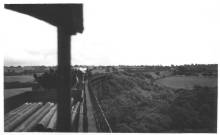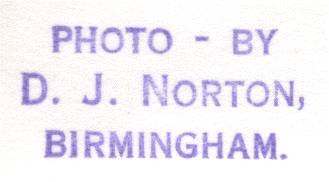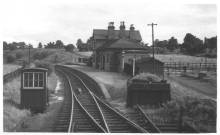 |
 |
 |
Halesowen Railway
"The Halesowen Railway is a much-lamented curiosity in the railway
heritage of Birmingham and the West Midlands. The line was, in
reality, two distinct branch lines that met at Halesowen station: one
the GWR branch linking Dudley with Halesowen, and a second line built
under the auspices of an independent railway company, the Halesowen
Railway (a company later to be jointly purchased by the Midland Railway
and the GWR when in administration), linking the Midland Railway’s
Birmingham to Gloucester line with Halesowen.The photographs below are concerned with the latter mentioned section of the line which, in itself, enjoyed a fascinating history. Opening to passenger services in 1883 (some 18 years after the Act authorising its construction was passed), the section of the line seen here was operated by the Midland Railway (although occasional GWR traffic did pass through), and carried services from Northfield station which left the Midland line at Halesowen Junction passing through the Austin car works to Longbridge (not to be confused with the current Longbridge station), Rubery and Hunnington stations before arriving at Halesowen.
However, passenger traffic was largely insignificant and the stations on the line closed in 1919 with the line remaining open for goods traffic and ‘Workmens Trains’ carrying ‘commuting’ Austin workers from Halesowen to the Longbridge works: a service which continued up until 1960.
The small branch line had itself three branches stemming from it at various periods of its history: a short branch leading to the Frankley waterworks and reservoir for construction traffic, a short branch leading to Hollymoor Hospital for the same reason, a goods siding at Hunnington serving the nearby Bluebird Toffee factory and a link to a quarry near the site of Rubery station. Arguably, however, the most impressive part of the branch was the 660 feet long, 100 feet high Dowery Dell (which itself was the area surrounding a small stream running through Twiland Wood between Rubery and Hunnington) trestle viaduct that was sadly cut up for scrap shortly after the line’s final closure in 1964.
Unfortunately, the line is no more but these previously unpublished photographs provide a fascinating insight into this rural branch line and their publication seems further apt by the recent planning and consultation exercises undertaken considering the feasibility of reopening part of the line from Halesowen Junction to near the site of Rubery Station, now in the heart of the Frankley housing estate."
Many thanks to Andy Doherty of Rail Around Birmingham who provided the notes above. You can find more information about the line on the MIAC website. Also, I'm sure this Railway Clearing House junction diagram from 1903 will be of interest.
To try and reduce download times I have divided the photographs into various sections. Please select the link of interest.
| Virtual Trip |
Ride the Halesowen Railway from
Old Hill to Longbridge |
| Enthusiast Pictures |
Like sidings, signals and
signs?
This is for you! |
| Odds & Ends |
Some late discoveries - well
worth a look |
| Colour
Photo's |
Full colour slides of the
Halesowen Railway! |
| A Day Out To Dowery Dell |
My experiences of visiting the
site of the trestle viaduct |
 |
 |